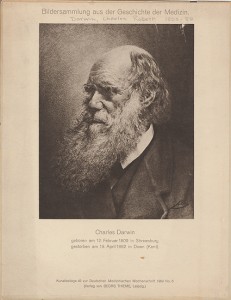Forget Valentine’s Day, did you wish someone Happy Darwin Day this week? International Darwin Day, which the Darwin Day Foundation describes as a “global celebration of science and reason,” is marked annually on February 12th, the birthday of the intrepid naturalist himself.
Sir William Osler (1849-1919) was an admirer of Charles Darwin’s (1809-1882) and counted in his personal library many of Darwin’s works, including a 3rd edition of his On the origin of species, containing the theory of evolution based on a process called natural selection, his 1871 The descent of man, and selection in relation to sex, examining the process of natural selection of humans, and his Journal of researches (also known as “The voyage of the Beagle”), a compilation of zoological and geological notes and observations made while on expedition with the HMS Beagle.
In his introductory essay to the catalogue of his collection, “The collecting of a library,” Osler shares some personal recollections that point to Darwin’s influence on his own intellectual development. As a student at the Toronto School of Medicine during the 1860s, the future Sir William lived, worked, and studied with Dr. James Bovell, for whom he kept the books and prepared specimens for microscope slides. Osler writes of the “mental tumult” of the sixties, during which “really devout students, of whom Dr. Bovell was one, were sore let and hindered, not to say bewildered, in attempts to reconcile Genesis and Geology.” Dr. Bovell himself was the sort of instructor, according to Osler, “more likely to lecture on what was in his mind than on the schedule, and a new monograph on Darwin or a recent controversial pamphlet would occupy the allotted hour.” Osler also waxes nostalgic over his student vacations spent with a microscope and copies of Darwin’s “’Voyage’ and the ‘Origin.’” (Bibliotheca Osleriana, xv-xxvi [McGill users])
In his catalogue notes for his copy of Darwin’s On the tendency of species to form varieties (1858), Osler recounts a meeting with Charles Darwin:
I only saw Darwin once. During the winter of 1872-3 his son Francis worked at the table next to me in Burdon Sanderson’s laboratory at University College. Several times in the spring he talked on taking me to Down for the week-end, but his father was ailing. It was, I think, the next spring, I mean in ’74, that I saw him at the Royal Society reception (?) He spoke much of Principal Dawson of McGill, for whose work on fossil botany he had a great regard. I remember how pleased I was that he should have asked after Dr. Dawson. He was a most kindly old man, of large frame, with great bushy beard and eyebrows. (B.O. 1565)

From the Osler Library Prints Collection. Photo-mechanical reproduction (photogravure). Published in Leipzig by Georg Thieme in 1909.

